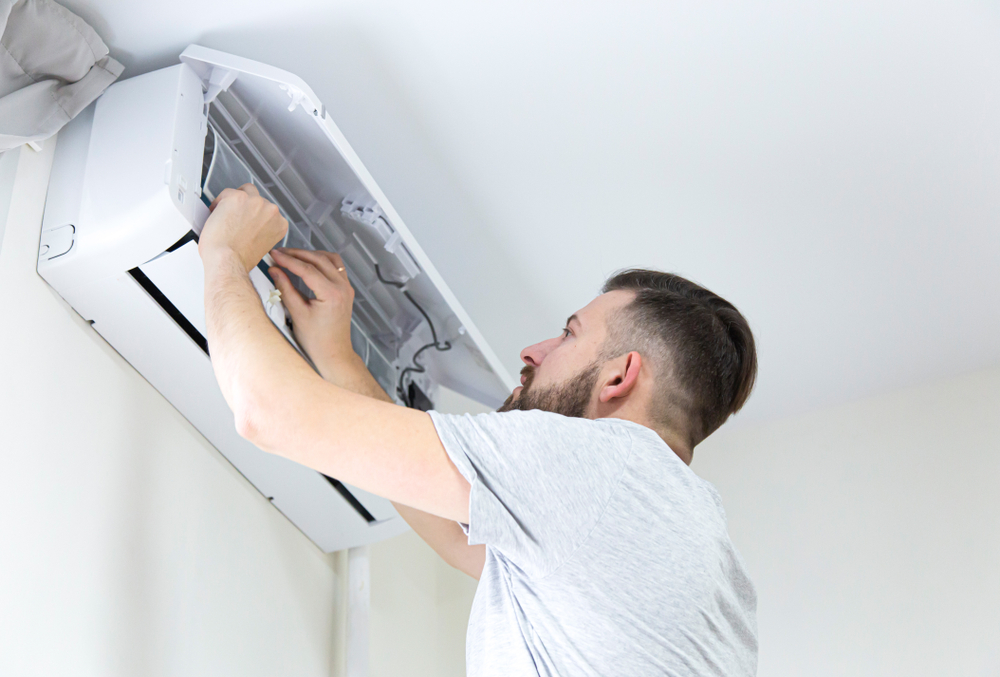If you want fewer breakdowns and lower bills, you may be wondering: How often should I service my A/C? Most Minnesota homes do well with one professional tune‑up each spring; homes with heavy use, pets, or allergies may add a mid‑season check.
To lock in peak performance, schedule Minnesota AC Maintenance with Neighborhood. Call 800‑570‑4328 or book online. Below is a simple schedule that fits Central Minnesota weather.

What Annual Service Means
Annual service is more than a “quick look” — it’s a complete system inspection and cleaning performed by a certified HVAC technician. During a tune-up, coils are cleaned to improve heat transfer, refrigerant is checked and recharged if necessary, and motors and capacitors are tested for early signs of failure.
Electrical connections are tightened to prevent unsafe operation, drains are flushed to avoid water leaks, and airflow is measured against manufacturer standards. This professional checklist ensures your AC is not only cooling properly but also operating safely and efficiently all summer long.
Why One Visit A Year Works For Most Homes
Because Minnesota’s cooling season is relatively short, most homes do well with one professional tune-up each spring. This visit prepares the system for peak summer loads before pollen, cottonwood fluff, and high humidity stress the equipment.
For households with pets, high dust levels, or allergy concerns, a second mid-season service is often recommended to keep airflow clean and strong. The right schedule depends on how heavily your system is used and the unique conditions inside your home.
How To Plan Your AC Service
To get the most out of maintenance, schedule your tune-up in early spring before the first major heat wave hits. This helps you avoid long wait times and ensures your system is ready before you need it most. In between visits, check or replace filters monthly in summer, especially if you have pets or live near trees that shed pollen and cottonwood. If airflow drops, ice forms on refrigerant lines, or your bills spike, schedule a mid-season inspection to prevent bigger problems. Think of service as both preventive care and an opportunity to catch small issues before they grow into expensive repairs.
- Book in spring before the first heat wave to avoid peak‑season delays.
- Set a recurring reminder to check and replace filters monthly in summer.
- Add a mid‑season visit if airflow drops, ice forms, or bills rise unexpectedly.
Recommended Service Timeline
| When | What To Do | Why It Matters |
|---|---|---|
| Early Spring | Full professional tune-up and coil cleaning | Prepares system for summer load and prevents mid-season breakdowns |
| Monthly in Summer | Check/replace filters; clear debris around condenser | Keeps airflow strong and protects coils from dirt and pollen |
| Mid-Season As Needed | Extra check if airflow drops, ice forms, or bills rise | Catches hidden issues like low refrigerant or failing components |
What Maintenance Saves
Routine maintenance can reduce energy use by 10–15 percent and prevent many common failures, including frozen coils, fan motor burnout, and compressor overheating. The cost of a tune-up is usually far less than an emergency repair call, which can run $300–$1,000 depending on the part.
Even more importantly, most manufacturers require documented annual maintenance to keep warranties valid, meaning skipping service could leave you paying out of pocket for major repairs. By saving receipts and service reports, you protect both your comfort and your warranty coverage.
Safety Benefits of Regular AC Service
A neglected air conditioner can become more than just inefficient — it can also create safety risks. Loose electrical connections can cause shorts or fire hazards, while clogged drains may lead to water damage and mold growth in your home. Refrigerant leaks not only reduce cooling but can also pose environmental and health concerns if undetected. A trained technician identifies and resolves these risks during routine maintenance, keeping your home safe as well as comfortable.
DIY Care vs. Professional Service
Homeowners can handle basic upkeep such as replacing filters, keeping outdoor units clear of grass clippings and leaves, and setting thermostats properly. However, tasks like coil cleaning, refrigerant testing, and electrical inspections require specialized tools and training.
Attempting these without experience can cause damage or void your warranty. A smart approach is to combine simple monthly DIY checks with an annual professional tune-up for maximum protection and efficiency.
Cost of Skipping Service
Skipping annual service might seem like a short-term saving, but it often leads to higher long-term costs. A dirty coil can increase energy bills by 20 percent, while a neglected drain line can cause water damage that costs hundreds to repair.
Worst of all, ignoring minor issues often leads to emergency breakdowns on the hottest days of the year, when repair companies are booked and prices run higher. Investing in regular maintenance is far cheaper and less stressful than facing a midsummer breakdown.
Ready To Schedule Annual Service
Protect comfort and efficiency with Minnesota AC Maintenance. Call 800‑570‑4328 or book online with Neighborhood’s certified techs.
Resources
ENERGY STAR – Keep Your HVAC Efficient
U.S. DOE – Maintain Your Air Conditioner
Further Reading
What Does an AC Tune-up Include?
5 Reasons Your Furnace Keeps Turning Off and On
6 Qualities to Look for in an HVAC Contractor
Frequently Asked Questions
Is twice a year service required?
Not for most Minnesota homes. Once each spring is typical; add a mid‑season visit for heavy use or allergies.
Do smart thermostats reduce service needs?
They improve comfort and control but don’t replace maintenance tasks like coil cleaning.
Can I align service with furnace checks?
Yes. Many homeowners schedule spring for AC and fall for the furnace.
Will missing service void my warranty?
Many manufacturers require annual maintenance; keep records.
What if my AC is new?
New systems still require yearly checks to maintain efficiency and warranty protection.



